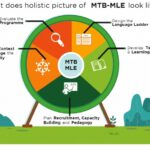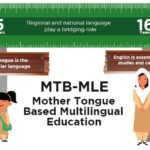- Educationists prefer ‘mother tongue’ as medium of instruction in primary years’ curriculum
- Schooling reduces to rote memorizing textbook
- Meaningless memorization of information leads to crisis
By Hamid Khan Wazir
ISLAMABAD: Unfamiliar language as a medium of instruction in the primary years’ curriculum in Pakistan hurts children’s ability to learn, to read, and understand concepts; resultantly it hinders intellectual growth and joy of learning because it reduced schooling to rote memorizing textbooks.
There is an overwhelming consensus amongst educationists around the world that learning should be in a language that students understand – usually the language that they speak at home, referred to as their ‘mother tongue’.
These were the findings of the three-year research study conducted by The Citizens Foundation (TCF), a non-profit organization set up in 1995 by a group of citizens who wanted to bring about positive social change through education.
The report finds that using familiar languages when children are young and then gradually introducing foreign languages maximizes comprehension and fluency.
It is no secret that primary education in Pakistan is not delivering the results and it could be judged from the fact that millions of children are not in school. And yet, millions more who attend school suffer the effects of a flawed education system.
For years, researchers have pointed to the myriad of challenges that the country’s education system faces – defective examination systems, poor physical facilities, lack of teacher quality, low enrollment, large-scale dropouts, corruption, poor management and supervision, lack of research, and policy implementation failures, to name a few.
However, the report revealed that in a Country with over 70 native languages, a critical impediment is the language used as the ‘medium of instruction.’ In Pakistan, parents demand ‘English-medium education’ for the many academic and professional doors, it can open for their children. But because the majority of teachers in Pakistan are not proficient in English, it is only textbooks that are in English while teachers and students speak local languages in the classroom that reduced schooling to rote memorizing textbooks.
The report stated that in a kindergarten classroom in Islamkot, a tehsil in the Tharparkar desert in Sindh, a child named Mehtab eagerly writes his name in English on the blackboard. He does a perfect job – carefully forming each letter of his name and then reading it loudly. However, it is not until the research team rubs off the last two letters of his name and asks him to read that he gives them a blank stare. Mehtab has rote learned his name, just as he is expected to rote memorize his textbooks.
This meaningless memorization of information happens in classrooms across Pakistan, where children’s language and cultural context is not taken into consideration. It has led to a crisis – one where children who regularly attend school can’t read or write a simple sentence in any language albeit being in school for several years.
While many valid questions arise from such a conundrum, this research also established that children who develop strong language skills in their own language are better able to learn foreign languages like English later on.
TCF partnered with the Thar Foundation in 2018 to develop a mother tongue-based multilingual education (MTB MLE) model for schools in the desert region of Tharparkar. While Sindhi is the provincial language in Tharparkar, over 13 sub-regional languages are used by the local population – these include Dhatki, Marwari, Katchi, Oadki, and Parkari. In Tharparkar, it is typical for children in one school to speak several different mother tongue languages.
Researchers and those who have implemented MTB MLE have observed these models’ benefits on three critical fronts:
- Cognitive understanding: strengthens students’ conceptual clarity and enables the original expression
- Academic utility: builds the foundation for the student to learn both academic subjects and unfamiliar languages effectively
- Social belonging: enables the development of confidence and self-esteem, as well as parental involvement in a child’s education
This initiative takes into account decades of scholarship and introduces an unprecedented mode of education planning – one that places the child at the center of their learning experience.
TCF sequenced the introduction of languages based on its research as follows: Build Foundations in Mother Tongue and Regional Languages from Pre-Kindergarten until Grade 3, gradually Transition to National and Foreign Languages in Grades 4 through 7 using Multilingual Instruction and rely on a National or Foreign Language as the Medium of Instruction for Grade 8 Onwards.
The MTB MLE initiative poses some challenges, even within the limited context of the 20+ schools, TCF is introducing this in.
First, many parents fear that the absence of education in English-medium jeopardizes future opportunities for their children in a national economy that prioritizes English. To address this, the design of MTB MLE systems requires the inclusion of feedback from parents, guardians, and community members.
Second, the design relies on a linear and incremental approach. This can pose a challenge for children joining the school at the middle or higher levels. Additionally, students who drop out to attend another school with a different curriculum will also face challenges. To alleviate these potential shortcomings, bridge or accelerated learning programmes will need to be incorporated into the design.
Third, given the challenge of multilingualism, countries like Pakistan should give thought to developing a cadre of teachers who are able to provide language instruction, in the mother tongue as well as second, third, and fourth languages.
For children who grow up in multilingual communities around the world, diversity has become a handicap rather than a source of strength. In Pakistan, the response to linguistic diversity has been a blunt insistence on the national and foreign languages, Urdu and English. This has made quality education impossible for the majority of Pakistani children who grow up without exposure to these languages, the report concluded.








